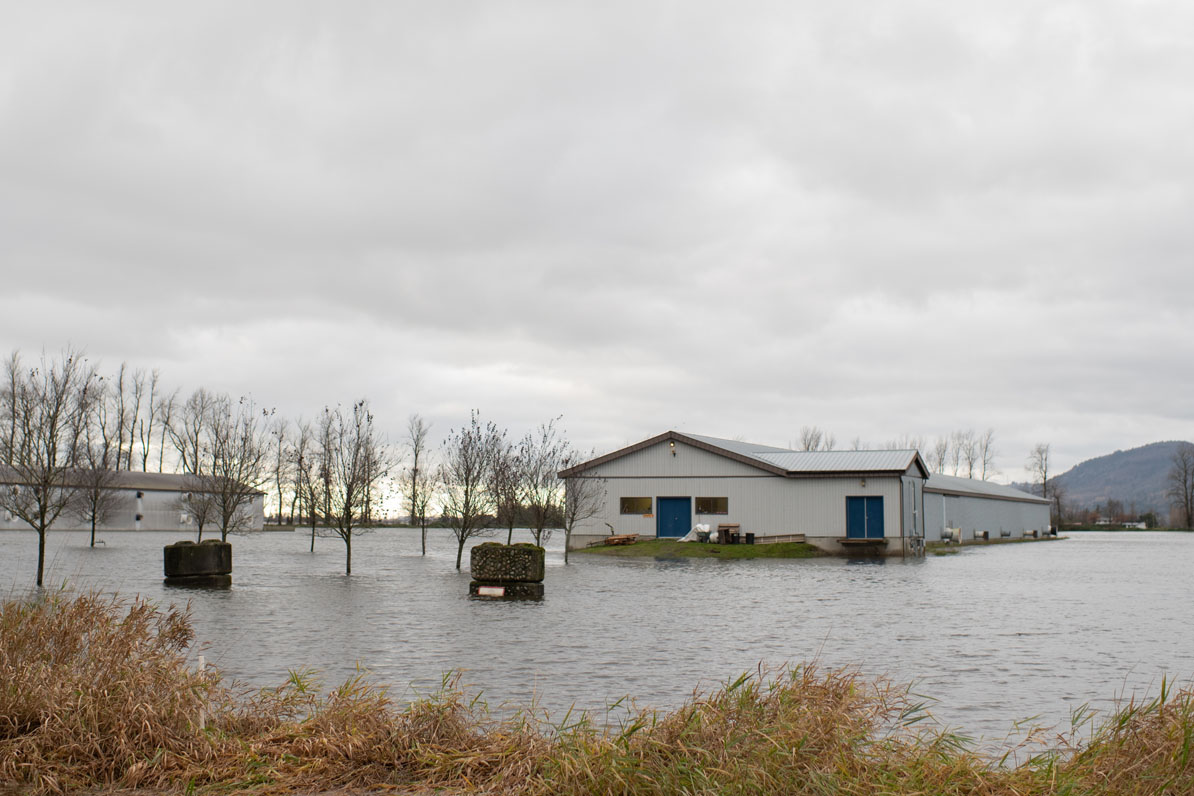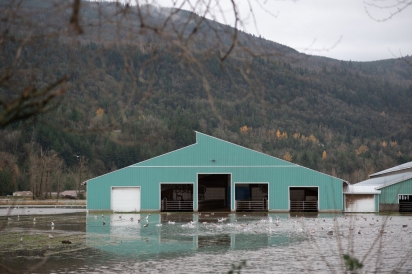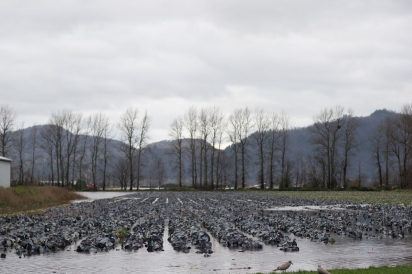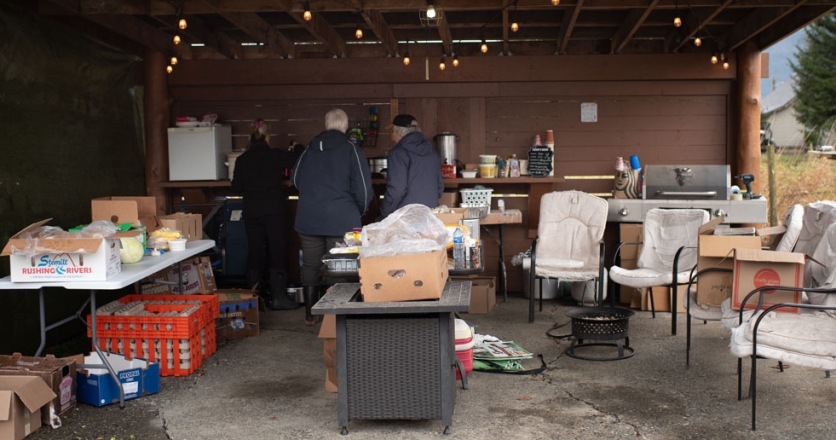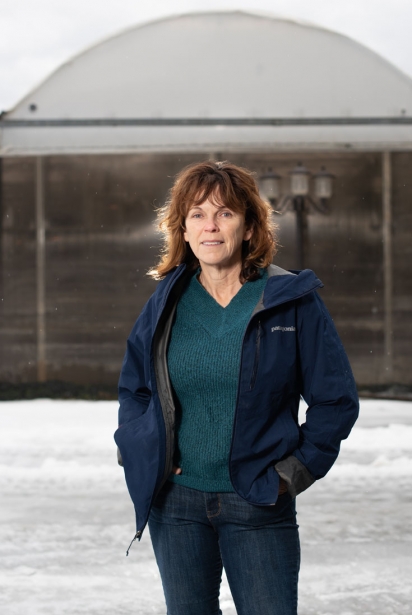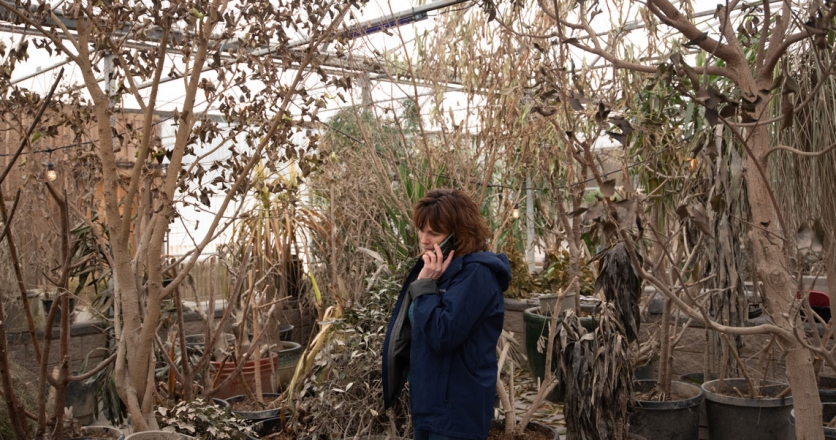After the Floods
Do you need anything to eat? A sandwich? A cup of coffee?” Victoria Kuit was startled by the offer when she slowed down to get a closer look at the roadside stand. Suddenly she recognized an elementary school friend she hadn’t seen for years. “No,” she told her long-lost friend. “I’m fine... why?”
“I’m giving meals to the farmers who’ve been flooded out and the volunteers sandbagging to save our community,” was the answer — referring to the November 2021 flooding in Abbotsford. As soon as Kuit heard this she knew she’d toss her hat in the ring to help. But she had no idea the casual exchange would reshape her life for the next several months.
“One day I was organizing a few crockpots to distribute,” she recalls. “The next I had semi-trucks full of donated food pulling into my driveway.”
When the Yarrow Food Hub got underway, Yarrowites were still in recovery mode themselves. Many were coping with localized flooding in basements, on hobby farms, or from landslides down Vedder Mountain.
Kuit grew up in Yarrow, the small Chilliwack town famous for its community spirit. As bad as things were in Yarrow, the f lood victims who’d lost their entire homes and livelihoods were on the Sumas Prairie in Abbotsford. While this postal code distinction matters to municipalities, it made no difference to Kuit. She helps everyone, 24/7.
The dairy farm Adria Janzen runs with her husband and their teenage sons is on one side of Boundary Rd., while her father-in-law’s chicken barns are on the other. Both were flooded on November 17th, 2021. With her husband helping his dad as much as possible across the street, and Janzen milking some of their cows at a farm where they were temporarily located (their livestock were sheltering at eight different farms), she had no time for anything else.
“At first I didn’t think we needed help,” she says. “Other farmers had lost everything. But one day we needed milk. We’re dairy farmers, and we didn’t have milk. We didn’t even have time to grab fast food.”
That was the moment she realized her family did need help. When she stopped at the Food Hub to pick up milk, “Victoria kept stuffing my sons’ pockets full of treats. She knows how much teenage boys eat. It was such a relief because then they weren’t constantly bugging our evacuation hosts for food. It was so needed, at just the right moment. It was amazing.”
Members of the tight-knit community stepped up in droves. Brian Louwerse of Yarrow General Store (who’s Janzen’s brother-in-law) provided tools, animal feed, and countless pairs of rubber boots to those in need. Missy Drysdale and Deseree Klimson tirelessly worked Facebook with targeted requests for aid, sourcing boots and other necessary supplies.
Because the Food Hub is a grassroots, volunteer-driven initiative without the restrictions governing municipal and institutional relief efforts, its support flows to any flood victims who need help — no matter where they live. And thanks to Kuit, support arrived fast, with no questions asked and no cumbersome paperwork.
Another difference is that the Hub provides any and everything — not just food. “Dehumidifiers, boots, gloves, safety gear, cleaning supplies, you name it,” explains Kuit. But food is where it all started.
As soon as Yarrow residents were back on their feet, hundreds began volunteering for the Food Hub. They provided a seemingly endless flow of crockpots full of hot homemade chilli, stew and soup. They baked countless batches of muffins, cookies and buns. They donated oodles of gift cards, flats of bottled water, crates of crackers, tubs of hand warmers, bags of toques and boxes of boots. Even the local Girl Guide unit pitched in by providing cheery handmade cards to boost morale.
“It was such a load off,” explains Janzen as she describes the process of flood recovery on the family dairy farm. “I’m usually the one who cooks everything, but with all that running around there was no way I could have managed to get groceries and do the cooking. We couldn’t have gotten through without that support. And we had a functional kitchen. So many people didn’t. And they still don’t,” she laments.
But hot meals and food hampers were only the beginning. “Soon we realized needs were changing almost daily,” explains Kuit. “First it was hip waders. Then it was warm clothing and boots. Now it’s dehumidifiers. Next week it will be something else.”
Despite all this tangible need, it didn’t take Kuit long to recognize that daily bread alone wasn’t the only thing that kept people kept coming back to the Food Hub. She quickly understood that those who’d been affected by the natural disaster — or simply witnessed their neighbours’ losses and hardships — also needed each other for emotional support.
Janzen confirms this. “It’s a great place to chat with the neighbours. Somewhere comfortable where we can all just sit and rest for a few minutes by the fire with a cup of coffee.”
Although harder to measure, this social support from the Food Hub is as important as the goods flowing in and out. The feeling of being supported and understood is crucial to resilience in the aftermath of a natural disaster. That’s what Kuit is serving up.
Down the road at Ripples Winery, owners Caroline and Paul Mostertman and their employee Michelle Dick, understand these uncertainties.
“It’s a different world out here in the aftermath,” says Dick, whose husband of 38 years passed away from brain cancer just a few months before the flood. “People who aren’t at ground zero don’t understand it.”
In 2015, Ripples became a sparkling destination where locals, tourists and wedding parties came to celebrate and take in the Secret Garden. "The beautiful clear roof reception space was filled with large tropical trees and plants and draped with elegant chiffon with massive, dimmable crystal chandeliers that twinkle all night. Water features add soft gurgles and the sent of jasmine and ginger lilies fill the night air,” as described on the website.
But now everything is gone, destroyed by the flood.
Mostertman and her husband have owned and operated the property for forty years, stewarding their farm from earthy beginnings as a hog operation.
Sadly, the flood destroyed most of their inventory. “Our biggest challenge has been losing so much stock,” Mostertman explains. “Barrels just floated away. And everything with a cork had to be discarded because it could have been contaminated by the toxic floodwater. We were able to sanitize bottles with screwtops.
We had some flood sales to clear out damaged inventory and bring in a bit of revenue.”
“At first I didn’t think we really needed the food Victoria was providing,” Mostertman admits, “but soon we realized it was a gamechanger.”
Once volunteer crews started arriving to help with demolition and restoration work, she realized there was no way to provide lunch. “I wanted to feed the people helping us, but we had no cooking facilities or refrigeration. There aren’t even any fast food places nearby. It was amazing to be provided with a crockpot and sandwiches for them every day.” Those lunches still arrive daily to keep the volunteer crews nourished.
“It really hit me just before Christmas,” says Mostertman. “We didn’t leave the farm for almost two months after the flood. If I’d had to go grocery shopping at Christmas time and seen everyone acting so normal, and bumped into people asking how we’re doing and wishing us Merry Christmas… well, it would have been too much.”
Christmas may be a distant memory now, but at the Yarrow Food Hub the word “angel” is still bandied about with casual yet heartfelt sincerity — probably because the comfort and joy are still flowing.
This joyful atmosphere is one reason Mostertman only ventures beyond her farm to go to the Food Hub; the “real” world is just too much. The Hub is a safe place where everyone understands the severity of the situation.
“It’s not just about food,” Kuit says. “It’s about friendship.”
Ripples remains an active construction site, but thanks to dedicated volunteers, restoration is moving along more swiftly than on most farms. A team of volunteer specialists even repaired and reupholstered the beautiful antique furniture in the tasting room. “With so much help from friends and our community, we’ll be up and running for weddings this summer,” says Mostertman with relief.
Months have passed since the flood, and the natural disaster has trickled out of public consciousness with the receding waters. But for the region’s farmers, every single day brings new reminders of the event, along with new challenges. For these folks — the very people who provide so much of our local milk, berries, meat, eggs and vegetables — it’s not over.
In fact, restoration work is just getting underway on most farms. With the help of huge volunteer crews, many farmers have been able to demolish damaged buildings and dispose of ruined equipment. Now it’s time to rebuild.
But that’s an expensive undertaking, particularly when insurance payments aren’t forthcoming (flood plain residents don’t qualify for flood insurance), and government aid is slow and complex to access. Many farmers don’t even qualify for this aid because their farm businesses grossed more last year than the stringent criteria allow.
Without the infrastructure of equipment and buildings to anchor their farm work, they can’t farm. And without income from crops or products rolling in any time soon, they won’t have the funds to restore the buildings or replace the equipment. Fortunately, caring volunteers committed to local food and farmers are still giving everything they can in the form of time, money, food and supplies.
Victoria Kuit remains the hub of this wheel that just keeps on turning — and churning out slivers of hope — because it has to.
“It’s far from over,” she reminds everyone who crosses her path. “The water may be gone, but that’s the only certainty right now. Nobody knows if the crops or soil will be viable in the spring. Most of the farmers aren’t even back in their homes. They still need food on the table. The need is great. People were so generous over the holidays, but I worry they’ve forgotten the need remains acute.”
When asked how people can help, her response is swift. “Send money. They need gift cards for gas, groceries and building supplies. Or send e-transfers. Or call me to find out what the needs are this week. This is sink or swim. We need our farmers to stay afloat. Without farmers, there’s no food.”
The Yarrow Food Hub
41620 No. 3 Rd, Chilliwack
yarrowfoodhub@hotmail.com | 604.798.0366
Ripples Winery and New Wave Distilling
3387 Tolmie Road, Abbotsford
rippleswinery.com | 604.864.1033 | newwavedistilling.com


